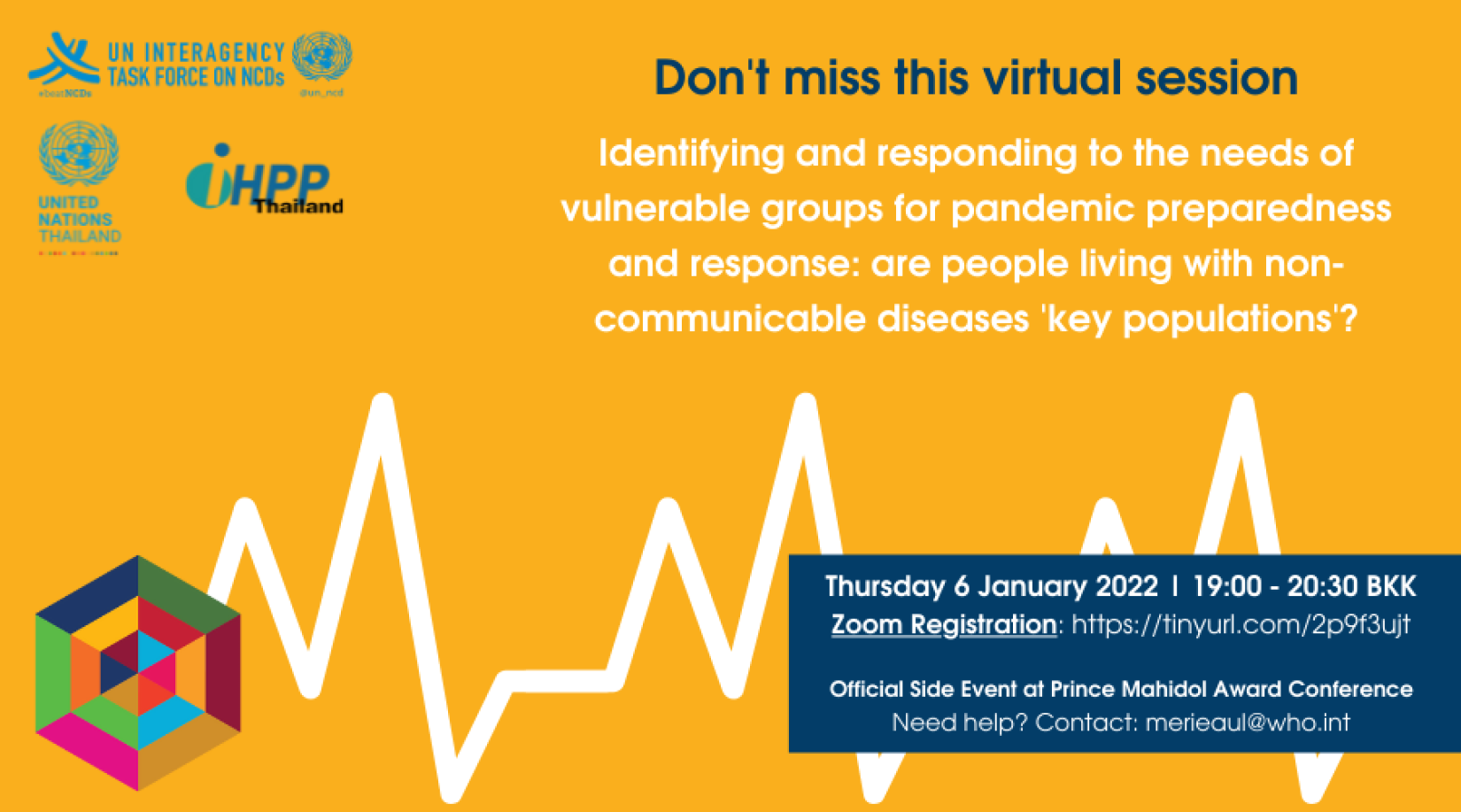Organizers
RCO, UN, WHOStream the Event
https://pmaconference-mahidol-ac-th.zoom.us/meeting/register/tZ0vd-uurDsqGt1Nk6I_33kPB1FnUjCxHjRkSustainable Development Goals
Contact information
rco-th@un.orgPrince Mahidol Award Conference (PMAC) 2022
Side Meeting | Identifying and responding to the needs of vulnerable groups for pandemic preparedness and response: are people living with non-communicable diseases ‘key populations’?
Date: Thursday, 6 January 2022
Time: 19:00 – 20:30 (7pm - 8:30pm - ICT Bangkok) [Time conversion: 7am-EST; 1pm-CET; 4pm-GST]
Registration: https://pmac2022.com/activity/33/sidemeetingOnline/detail
Session aims:
- explore options and tools for actions to integrate NCDs in country-level pandemic preparedness and response (PPR) agendas and in global health security mechanisms
- explore global, regional and domestic financing of country support for addressing NCDs as part of PPR implementation; and
- discuss the role of the recently established UN Multi-Partner Trust Fund for NCDs & Mental Health in strengthening resilience against future threats, better preparing us for tomorrow’s challenges.
Invited panelists:
- John Nkengasong, Director, Africa Centres for Disease Control and Prevention, Ethiopia
- John-Arne Røttingen, Ambassador for Global Health, Ministry of Foreign Affairs, Government of Norway
- Thaksaphon Thamarangsi, Director, International Health Policy Program, Government of Thailand
- Cecilia Oh, Programme Advisor, HIV Health and Development Group, UNDP Thailand
- Patrick Osewe, Chief of the Health Sector Group, Asian Development Bank, Philippines
- Katie Dain, CEO, NCD Alliance, Switzerland
- Tom Bollyky, Director of the Global Health Program, Council on Foreign Relations, Washington, D.C., USA
Co-moderators:
- Gita Sabharwal, UN Resident Coordinator in Thailand
- Nick Banatvala, Head of Secretariat, UN Inter-Agency Task Force on the Prevention and Control of Non-communicable Diseases
Location
About the event

The burden of non-communicable diseases (NCDs) is one of the most important modifiable risk factors for COVID-19 and future pandemic threats. COVID-19 is interacting with NCDs and inequalities to form ‘the perfect storm’ of avoidable death and suffering, contributing to overrun health systems, economic contraction, and wider sustainable development setbacks, particularly for people who are already vulnerable[1].
The world is currently paying the price for decades of inattention to NCDs, and thus far, the recent intensified attention to pandemic preparedness and response and global health security continues to overlook these conditions. Yet nearly one fourth (22%) of the world’s population is estimated to have an underlying condition that increases their vulnerability to COVID-19 and other future pandemic threats[2].
People living with NCDs (PLWNCD) are a vulnerable group for pandemic threats, ranging from COVID-19 to influenza, and are therefore a “key population” for pandemics. The risk that this group faces should be addressed through targeted policy and action on specific NCDs.
Ongoing discussions and proposals on measures to strengthen pandemic preparedness and response need to be broadened beyond surveillance, containment, and vaccination. For a meaningful, sustainable response to the prospect of future pandemics, it is crucial to include metrics on population health, specifically NCDs disease burden, in analysis and quantification of pandemic risk; and to support countries to implement best practices as core capacity building for prevention and control of NCDs to manage pandemic risk.
This session will bring together experts from different Ministries of Health, UN agencies, civil society, academia and other institutions, to explore options for action to integrate NCDs in country-level PPR agendas and in global health security discourse; to consider options for global and domestic financing of country support for addressing NCDs as part of PPR implementation; and to discuss the importance of cross-sectoral financing collaboration such as that offered by the recently established UN Multi-Partner Trust Fund for NCDs & Mental Health in supporting countries in pandemic recovery and in resilience to future threats.
The outcome of the session will be an authored perspective/editorial publication on the subject of key population identification and support in PPR.
--
[1] https://blogs.bmj.com/bmj/2020/06/10/non-communicable-diseases-and-covi…
[2] https://www.thelancet.com/pdfs/journals/langlo/PIIS2214-109X(20)30264-3…
